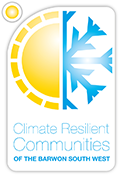Background
The South West Climate Change Portal is a collaboration between the councils of the Great South Coast (under the Climate Resilient Communities of the Barwon South West project) and the Corangamite and Glenelg-Hopkins Catchment Management Authorities, in partnership with the Centre for eResearch and Digital Innovation. The portal is an enabling and information tool with a key target audience being the south-west region’s planners and those working directly with the region’s community stakeholder groups.
To achieve this, the portal:
Provides regional information on the projected changes in climate and its likely impact on the region’s economic, social and environmental assets
Provides guidance in developing adaptation and mitigation actions to address the impact of climate change on the region’s economic, social and environmental assets
Identifies priority landscapes for carbon plantings and other carbon sequestration methods, as well as strategies to build landscape integrity
Provides guidance for regional decision-making, community engagement and research needs to improve understanding of the impact of climate change, and how we can manage those impacts.
The portal incorporates all relevant climate change data and information, with the ability to include new information as it becomes available. Community groups and regional stakeholders can use the portal for planning and developing projects that address climate change, can build on this information through adaptive learnings and are able to search for relevant information by either location and/or topic.
The portal promotes the sharing of knowledge and information throughout the south-west in the hope that all climate change projects, data and information in the south-west will be added to the portal over time.
Climate Resilient Communities of the Barwon South West
The Climate Resilient Communities of the Barwon South West project (the CRC Project) is a joint collaboration between 10 local governments, the Victorian Government and a range of partners. The project aims to help communities throughout the Barwon South West region understand what risks or opportunities might be presented by future extreme weather events.
The CRC Project is being delivered in two key parts: Phase One and Phase Two. Phase One was completed in 2014 and included a climate science review, a planning action review and range of strategic discussions to identify priority projects to manage climate risks. Recommended projects, now being delivered by Phase Two, are captured in the Phase One Report. Examples include the development of Climate Adaptation Plans for councils involved in the project and the development of this portal.
More information on the CRC project can be found at https://www.swclimatechange.com.au/cb_pages/climate_resilient_communities.php
Glenelg-Hopkins Catchment Management Authority
The Glenelg Hopkins Catchment encompasses the Glenelg, Hopkins and Portland Coast Basins lying south of the Great Dividing Range in south western Victoria. The region 25,000 square kms, includes the cities and townships of Ballarat, Hamilton, Warrnambool, Ararat, Casterton, Mortlake, Port Fairy, Beaufort and Portland.
Glenelg Hopkins CMA has received Australian Government funding to develop an NRM plan for Climate Change to support the Glenelg Hopkins Regional Catchment Strategy 2013-19.
The NRM plan for Climate Change:
- identifies priority landscapes for carbon plantings and strategies to build landscape integrity
- guides adaptation and mitigation actions to address climate change impacts on natural ecosystems
- helps to guide the location and nature of biodiverse plantings and revegetation activities optimise carbon co-benefits for biodiversity, water and agricultural production
- uses the best available information to identify priority actions
- was developed in collaboration with government, community and other stakeholders
The Glenelg-Hopkins NRM Plan for Climate Change can be viewed at https://www.swclimatechange.com.au/cb_pages/planning.php
Corangamite Catchment Managament Authority
Corangamite CMA is committed to healthy catchments and waterways. Established in 1997, The Corangamite CMA's goal is to ensure the protection and sustainable development of natural assets within a boundary stretching from Geelong to Ballarat and along the coast to Peterborough. To achieve this, the Corangamite CMA coordinates, facilitates and leads an integrated approach to the protection and enhancement of land, water and biodiversity of the Corangamite region by engaging and supporting the community and regional partners.
The Corangamite CMA has worked in consultation with a wide range of stakeholders to develop the Corangamite Natural Resource Management (NRM) Plan for Climate Change. The plan is an enabling document with a key target audience being the region’s NRM planners and those working directing with the region’s NRM groups.
To achieve this, the plan:
- Provides regional information on the projected changes in climate and its likely impact on the region’s natural assets
- Provides guidance to the Corangamite CMA and other regional NRM agencies in developing adaptation and mitigation actions to address the impact of climate change on our region’s natural ecosystems
- Identifies priority landscapes for carbon plantings and other carbon sequestration methods, as well as strategies to build landscape integrity
- Provides guidance for regional decision-making, community engagement and research needs to improve understanding of the impact of climate change, and how we can manage those impacts.
The Corangamite NRM Plan for Climate Change can be viewed at http://v3au.zone-secure.net/drive/6990/255083/
Acknowledgements
In developing the South West Climate Change Portal, the Climate Resilient Communities of the Barwon South West Project, as well as the Glenelg-Hopkins and Corangamite CMAs, would like to acknowledge the input of our partner agencies and groups.
We would like to especially thank the following:
The Australian and Victorian Governments for providing investment into the development of the portal, as well as their contiual support in future developments.
Centre for eResearch and Digital Innovation for their expertise, innovation and constructive feedback in the development of the portal. A special mention to Peter Dahlhaus, Andrew MacLeod and Birgita Hansen for their ongoing support.
The portal's photographers, in particular Lachlan Manly (www.lachlanmanleyphotography.com/), Rick Knowles (http://rickknowlesphotography.com/) and Alison Pouliot (http://alisonpouliot.com/). Your photographs have really shown life into the portal - thank-you.
We would also like to acknowledge the traditional custodians of the land where we work and pay our respects to the Elders, past and present.








